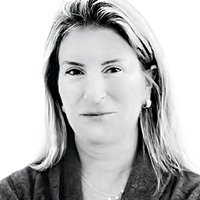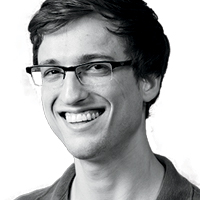Take Five
Five alumni reveal why STEM gives them joy.
Monica Van Aken ’84
 Headmistress, Milwaukee Montessori School
Headmistress, Milwaukee Montessori School
Major: American Civilization
How do you approach STEM education?
I do a lot of reading and researching to find out what’s happening—but at a different level. You can’t go to elementary and middle schools to find new, innovative things. So I look elsewhere. What’s Lafayette doing? What’s the Army doing? What’s GE doing? I talk to mechanical and computer and electrical engineers and ask them what’s going on with technology.
What do you love about your work?
I love that we are producing high-achieving students who love engineering and computer science in one of the poorest cities in the country. Fifty-eight percent of our students are non-white, and many are poor. I love that we are helping kids maximize their potential. If we want tomorrow’s scientists and entrepreneurs to look like the rest of America—meaning diverse—we need to take great pains to help high-achieving kids from poor families. I want all of my kids to be able to get into Lafayette. Can they? I think a lot of them could.
Amy Mussen ’00
 LEED Green associate,
LEED Green associate,
STEM educator, Gillman School in Baltimore
Majors: Civil and environmental engineering, international studies
How do you approach STEM education?
I think back in the 1980s and 1990s, art was an afterthought with tech. If you think about IBM, it was like, “Time to make the doughnuts.” But then with Steve Jobs you were looking at industrial design that was beautiful and functional. I’ve been reading a lot from the big thinkers in this area, and they point out that opportunities in technology won’t be going to people who understand the science. They will go to people who can innovate. I think art is important for opening up that part of the brain. The people who call the shots in this world are people with artistic vision.
What do you love about your work?
I love seeing the joy on kids’ faces when they discover something and figure out a solution. In college, I definitely felt like a minority in my engineering classes. I was one of two women in a class of 15 civil engineers. Now I teach at an all-boys school, and I think that it’s important for boys to see a female engineer in an authority role.
Lucas Landherr ’05
 Associate teaching professor of chemical engineering, Northeastern University
Associate teaching professor of chemical engineering, Northeastern University
Major: Chemical engineering
How do you approach STEM education?
Research shows that fourth-graders start losing interest in math, and that’s because it starts getting harder. Half the battle is getting them to feel confident about the subject matter and willing to pursue it—even if they don’t fully understand that. I think teaching the material in a visual way can be a curriculum tool to help students regain that confidence so they are more receptive to learning.
What do you love about your work?
When I was at Lafayette, I had a really tough semester my junior year, and I felt like my butt was getting handed to me when I was trying to understand transport and thermodynamics. At the end of the semester, when I realized how much I had learned, it occurred to me how effective my professors had been at teaching me. That’s what sparked my interest in education. Now, I look at my students, and I try to recognize that they have different needs and interests. What was hard for me might be easy for some of them, and what was easy for me might be hard for them.
Michael Hadley ’10
 Adjunct professor, Art Institute of Chicago and University of Chicago
Adjunct professor, Art Institute of Chicago and University of Chicago
Majors: Computational neuroscience, psychology
How do you approach STEM education?
The amount of technology around is sometimes overwhelming. I think that digital literacy and software literacy are really important skills. Even if you’re not going to be a software developer or you’re not going to use those skills in your job, having some knowledge of fundamental things of how software and technologies work, it’s really important. It helps you be able to intelligently participate in the world.
What do you love about your work?
I believe in the idea that knowledge and tools should be accessible to anyone who wants them. I have been collaborating with a company called Edoveo that makes custom software that is being introduced to prisons. I came on board to build a series of classes on web development. I’ll be teaching incarcerated people the basics of building a website in an interactive environment. I think education is a fundamental thing that gives you new opportunities
to improve.
Eugene DeLoatch ’59
 Dean, Clarence M. Mitchell Jr. School of Engineering at Morgan State University
Dean, Clarence M. Mitchell Jr. School of Engineering at Morgan State University
Major: Civil engineering
How do you approach STEM education?
I tell my students that they have to make a contribution. Their existence is a statistical accident. We need to work together to push the knowledge base so people can enjoy quality of life regardless of where they live. We need technology that will help people in intensive care units; improve prosthetics for people who return from war; send crews to the moon to set up manufacturing facilities there. And then we need people who can get us to Mars.
What do you love about your work?
I have been very focused on working to encourage diversity in engineering schools. When I graduated, less than 1 percent of the country’s engineers were African American. Today, 50 percent of my engineering students are African American, but we have work to do. I think that diverse thinking is key for innovating and problem-solving. The way we find a solution to a problem is determined by the people we have sitting around a table. We approach the problem based on our backgrounds and life experiences.